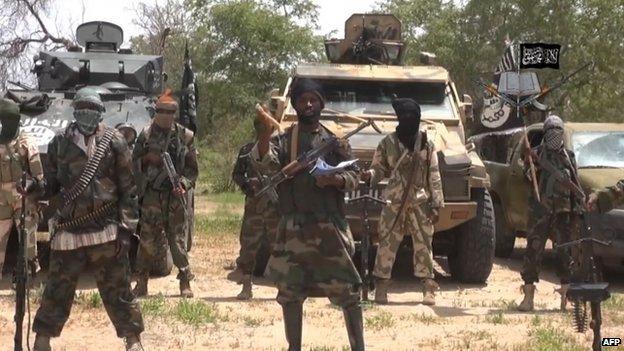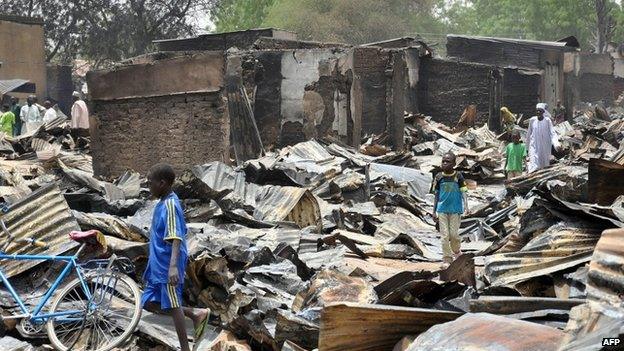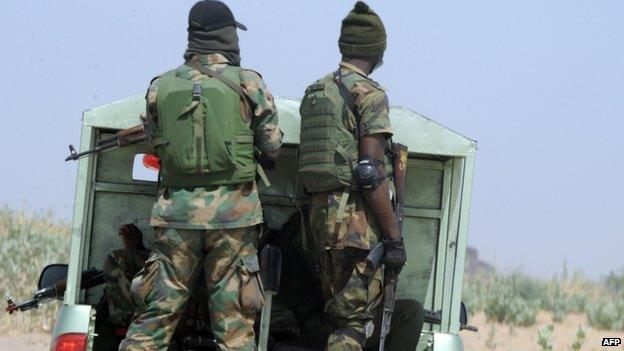Nigeria army committed atrocities, Amnesty says
- Published
Tommy Olapido reports on the alleged atrocities carried out by the Nigerian army in their fight against Boko Haram
Nigeria's army has committed atrocities in the north-east in its fight against Islamist militants belonging to Boko Haram, Amnesty International says.
The campaign group said it had seen "gruesome footage" including alleged members of the military slitting the throats of detainees.
The Nigerian authorities said such barbarity had no place in the military and promised to investigate.
Boko Haram has been waging an insurgency in Nigeria since 2009.
BBC News examines the challenges facing Nigeria's president, in 60 seconds
Thousands of people have been killed in a series of bombings and assassinations in the north-east and in the capital, Abuja, this year alone.
'Extrajudicial executions'
Amnesty says footage obtained from multiple sources on a trip to Borno state, in the north, "includes horrific images of detainees having their throats slit one by one and dumped in mass graves".
The perpetrators "appear to be members of the Nigerian military and the "Civilian Joint Task Force" (CJTF), state-sponsored militias," the organisation adds.

Boko Haram sparked international outrage by abducting more than 200 girls from a school in Borno in April

The group often razes homes and shops to the ground in its attacks
"The ghastly images are backed up by the numerous testimonies we have gathered which suggest that extrajudicial executions are, in fact, regularly carried out by the Nigerian military and CJTF," says Amnesty International Secretary General Salil Shetty.
The Nigerian authorities say they are "deeply concerned" about the footage in circulation, adding: "That level of barbarism and impunity has no place in the Nigerian military."
The incident in question involved 16 young men and boys - nine who had their throats slit and five others who were shot dead - on the same day as a Boko Haram attack on a military detention centre near Maiduguri, the capital of Borno state, on 14 March this year.
Senior officers and forensic experts will investigate the footage "in order to ascertain the veracity of the claims with a view to identifying those behind such acts", Nigeria's Director of Defence Information, Brigadier General Chris Olukolade, said in a statement.

The Nigerian army has denied previous reports of human rights abuses
Amnesty says it also has footage showing the aftermath of a Boko Haram attack on a village, where militants killed almost 100 people and destroyed dozens of homes.
Boko Haram and other armed groups were responsible for "a huge number of heinous crimes - like the abduction of the schoolgirls in Chibok more than three months ago - but the military are supposed to defend people, not to carry out further abuses themselves," says Salil Shetty.
Amnesty has called for an investigation into what it calls "the pattern of serious and systematic violations of human rights and international humanitarian law by all sides".
Boko Haram - which is opposed to Western education - began its insurgency in 2009, with the aim of setting up an Islamic state.
In May 2013, Nigeria's President Goodluck Jonathan imposed a state of emergency in the northern states of Borno, Yobe and Adamawa, vowing to crush them.
However the militants have stepped up attacks, killing more than 2,000 civilians this year, according to New York-based Human Rights Watch.

Who are Boko Haram?

Founded in 2002
Initially focused on opposing Western education - Boko Haram means "Western education is forbidden" in the Hausa language
Launched military operations in 2009 to create Islamic state
Thousands killed, mostly in north-eastern Nigeria - also attacked police and UN headquarters in capital, Abuja
Some three million people affected
Declared terrorist group by US in 2013